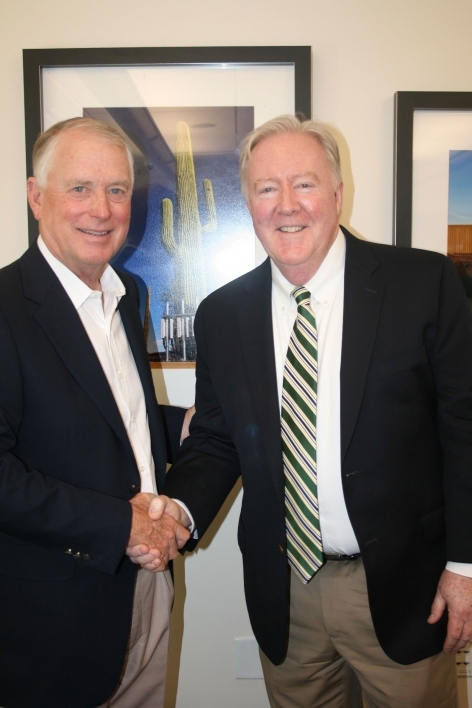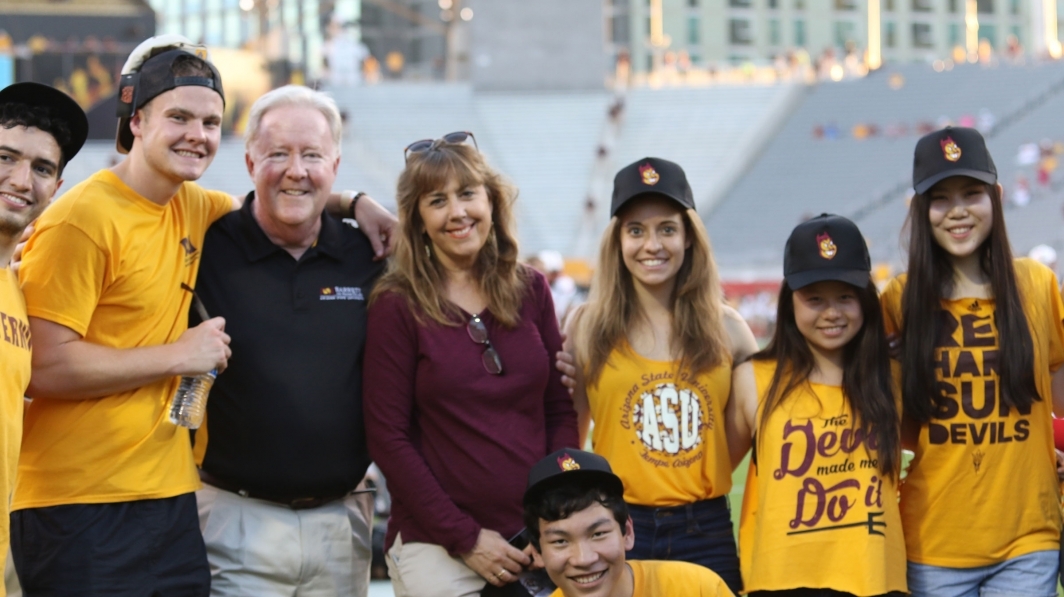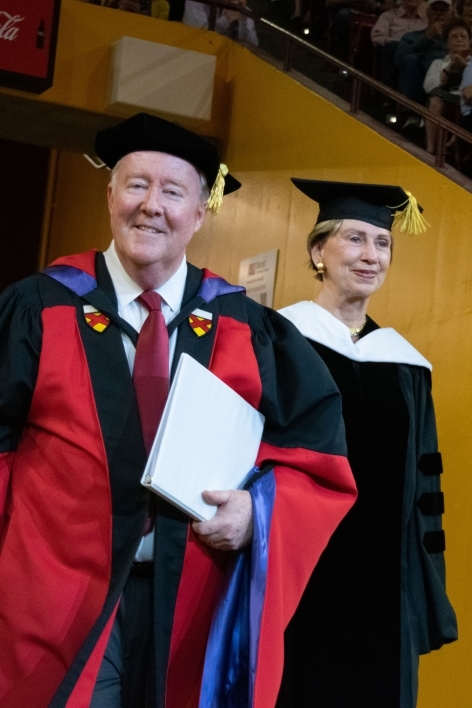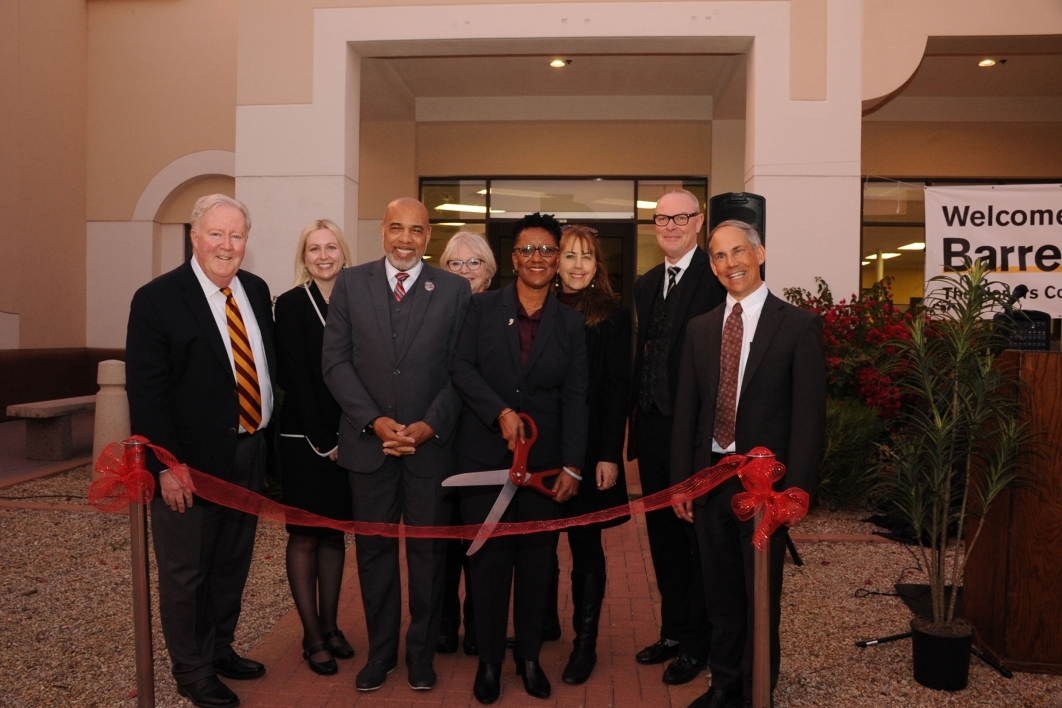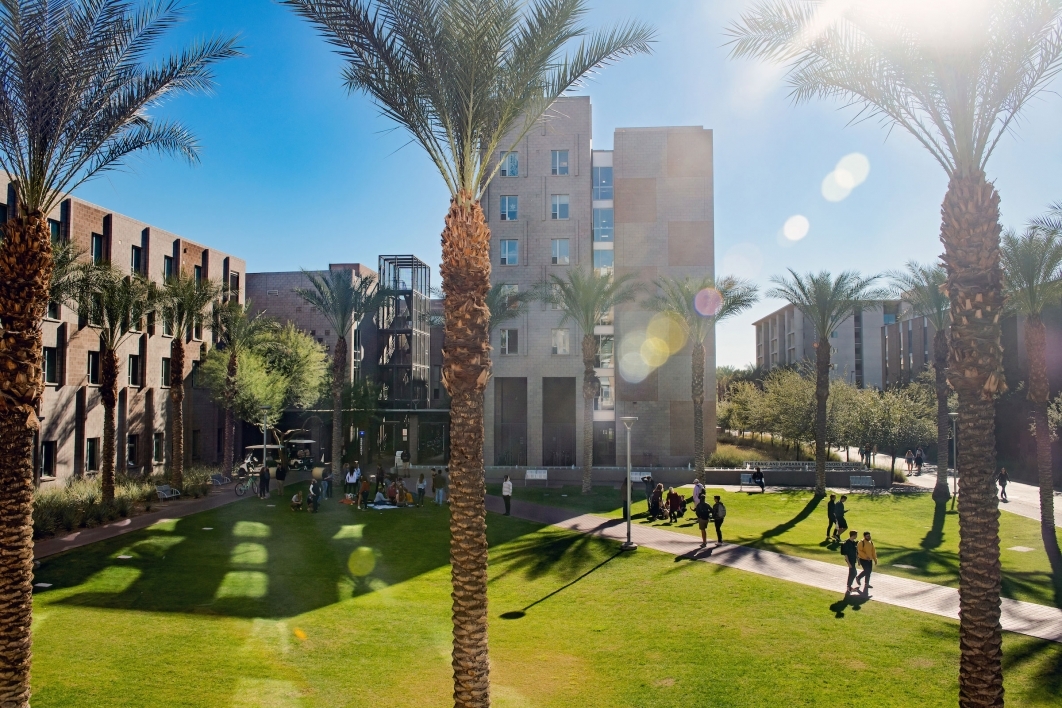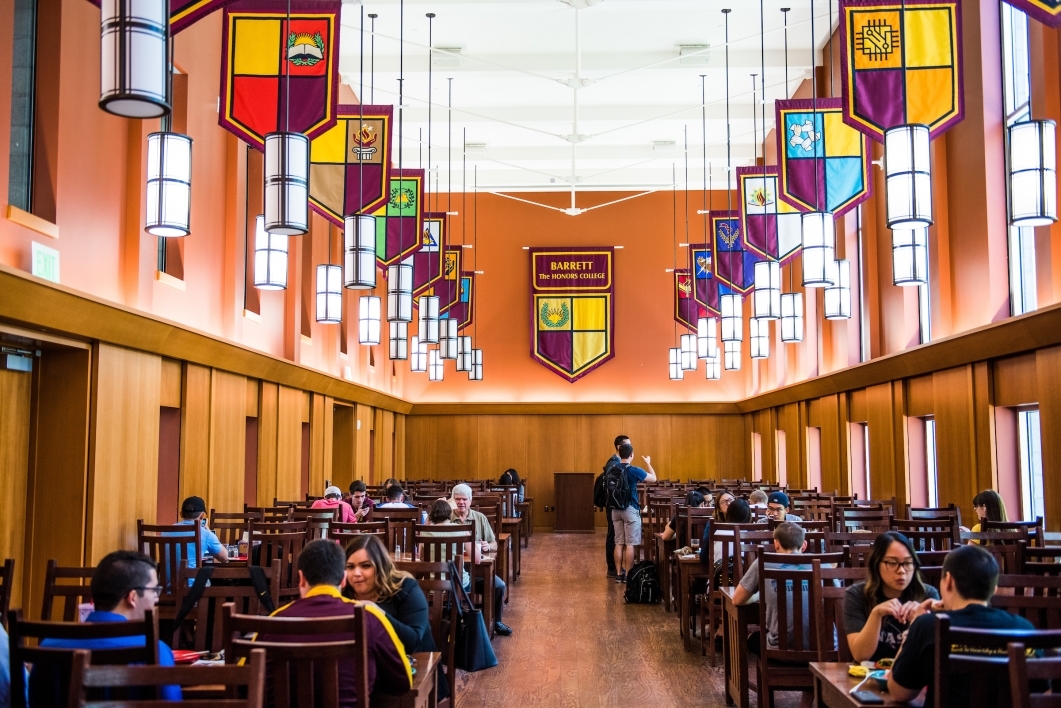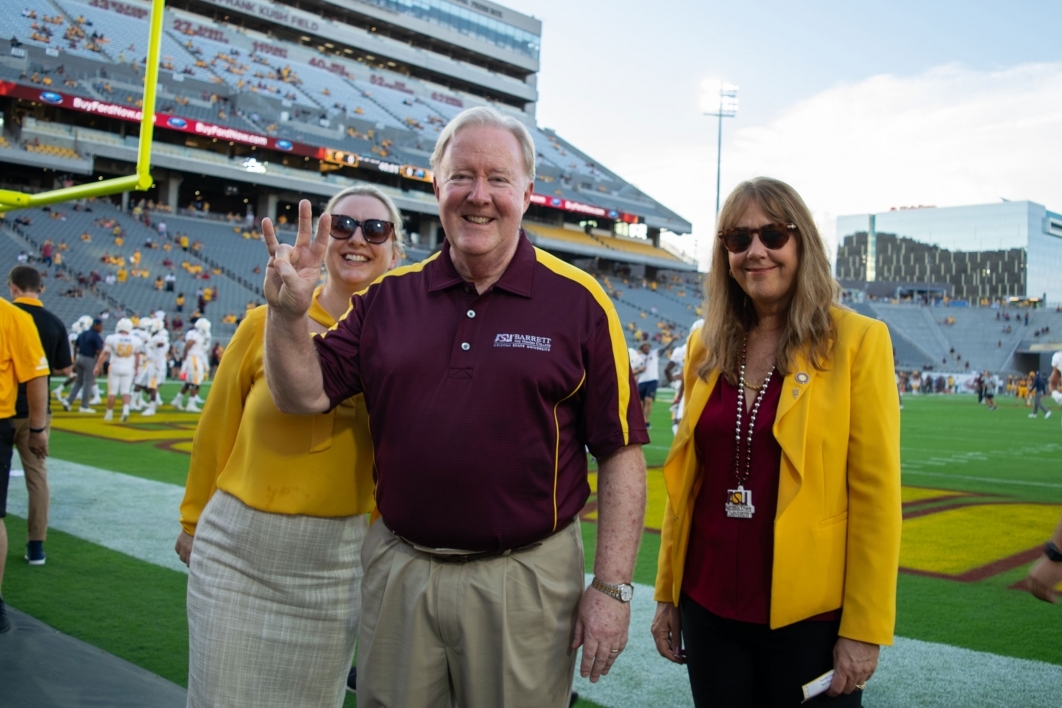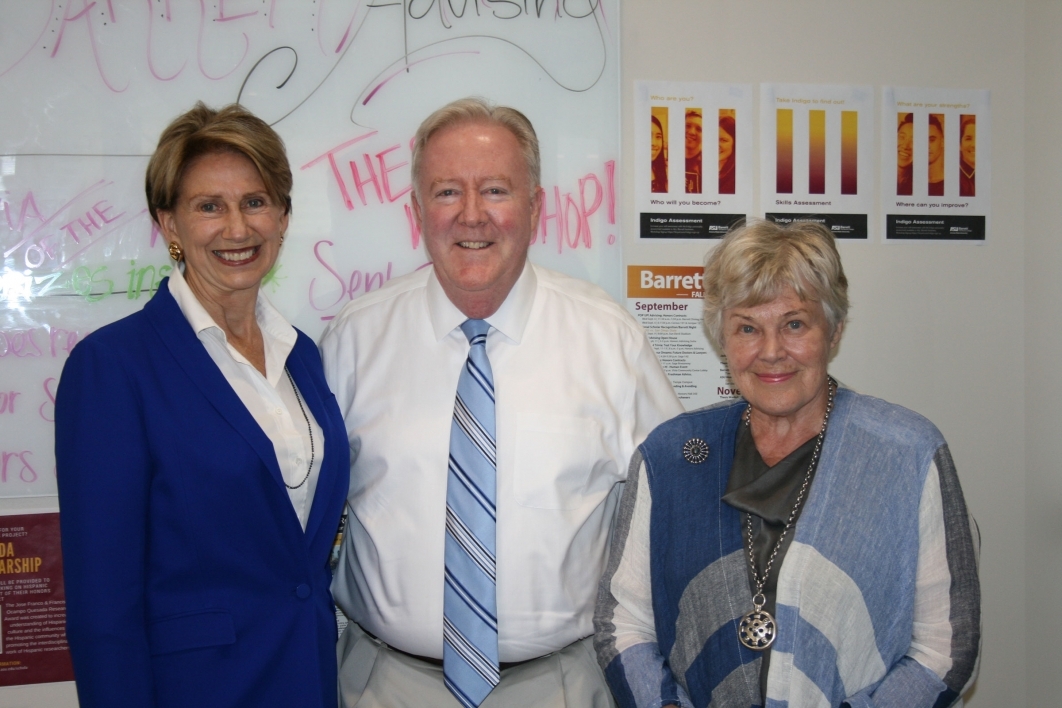Barrett Honors College Dean Mark Jacobs retiring after nearly 20 years of service to ASU
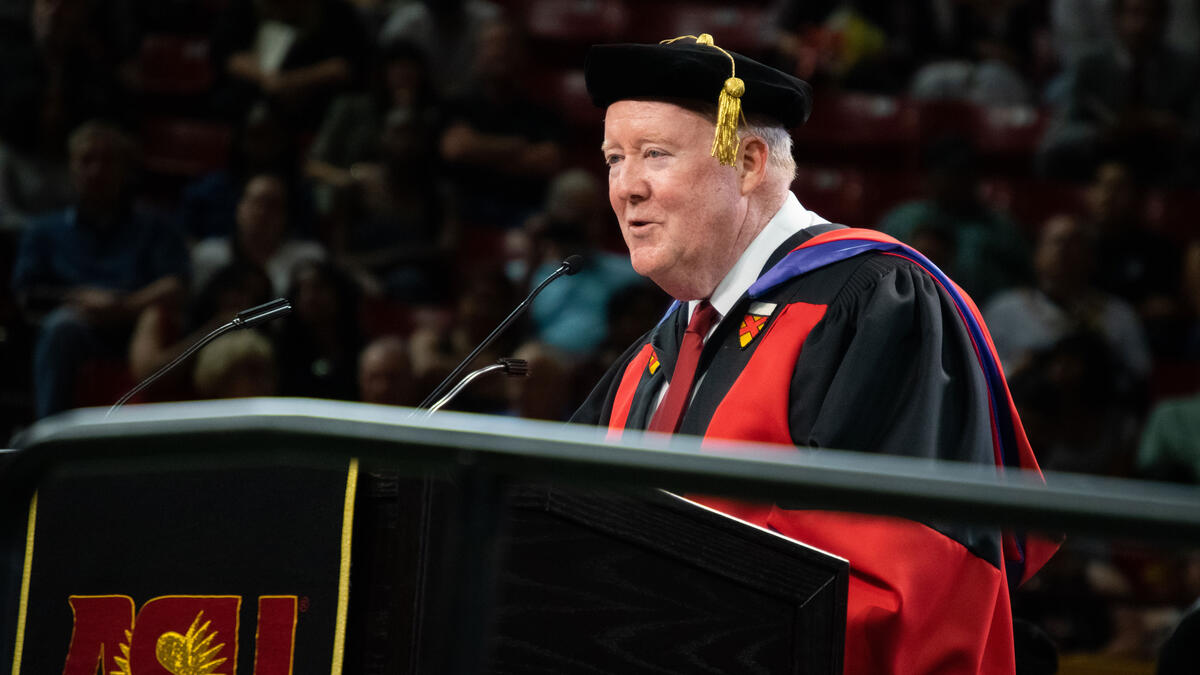
As a university student, Mark Jacobs always hated descending into dark residence hall basements to do his laundry, but he liked mingling with and sharing conversations with fellow students and faculty in a central dining hall, and spending time out from studying in grassy outdoor spaces.
So when, as dean of Barrett, The Honors College at Arizona State University, he had the chance to contribute ideas to the design of the college’s residential complex on the ASU Tempe campus, he made sure to suggest laundry rooms be located on the upper floors of residence halls, and that there be outdoor courtyards and a dining hall with a refectory modeled on the one at New College Oxford in England.
Dean Mark Jacobs
As dean, he was as committed to students’ intellectual growth as to their quality of life on campus, and he believed the new Barrett Honors College Tempe complex should reflect that.
In 2009, true to Jacobs’ vision, ASU’s four-year residential campus for honors students opened on nine acres at the southeast corner of the Tempe campus, with residence halls accommodating 1,700 students, classrooms, social lounges, a dining center, cafe, courtyards, an outdoor fireplace, an environmentally sustainable residence hall with a rooftop organic garden, offices for administrators, faculty and staff, and laundry rooms on the top floors of residence halls, next to lounges with natural light streaming through large windows.
After 19 years of service as the dean of Barrett, The Honors College, Jacobs intends to retire at the end of the 2021–22 year. The Barrett Tempe complex is part of the legacy he will leave the university.
Jacobs came to ASU in the fall of 2003 from Swarthmore College in Pennsylvania, where he had held an endowed chair in biology and had been both chair of the Biology Department and associate provost of the college.
“Some people at ASU focus on the comma as the great differentiator of Barrett, The Honors College,” said ASU President Michael Crow. “What makes Barrett distinguishable isn’t the punctuation, it’s the people who have made this unique honors college what it is — one of the finest colleges for honors students in the country. Quality and excellence are as much a part of what makes ASU what it is as access, and it is people like Mark Jacobs who have made sure we establish the very highest standards in that regard.
"His work has carried Barrett from what was still a work in progress to what is now one of the great successes of the entire university. We are grateful for the work he has done to help establish what is today a truly remarkable college that he will hand off to its future leaders.”
ASU Executive Vice President and University Provost Nancy Gonzales echoed those sentiments.
“As the architect for ASU’s top-ranked honors college, Mark Jacobs brought a deep understanding of our students and what is required to create a community that would meet their needs on many levels — intellectually, socially and culturally. Barrett now attracts outstanding students from across the country, and the entire ASU community has benefited,” Gonzales said.
“We will immediately launch a national search for the next dean. We expect this opportunity will attract a visionary leader who understands Barrett’s unique position among honors colleges nationally and is prepared to lead its continuous evolution for future generations.”
Craig Barrett, former Intel CEO, and Barbara Barrett, former U.S. secretary of the Air Force, said in a joint statement, “Under the steady hand of Dean Mark Jacobs for almost two decades, Barrett Honors College has inspired students, administration, faculty and alumni.
“Dean Jacobs designed an innovative residential and academic micro-campus, expanded student global exposure opportunities and modeled the best in honors college protocols. No wonder high-performing honors colleges everywhere study his pioneering vision. While we will miss his talents and charm, our greatest sentiment is gratitude for his steadfast leadership.”
In addition to the construction and opening of the Barrett Tempe complex, the honors college experienced significant milestones under Jacobs’ leadership.
In recent years, the honors college expanded into Barrett @ Vista del Sol — a complex covering more than 20 acres adjacent to Barrett Tempe and accommodating 1,800 sophomore, junior and senior students in an apartment-style living community with easy access to faculty and staff offices, classrooms, the dining center and other services.
The honors college has evolved with full honors facilities, including faculty and staff offices, community space and residence halls on all four ASU campuses, consistent with the New American University concept of one university in many places.
Honors course offerings, including signature classes called The Human Event and The History of Ideas, are supplemented by study abroad programs in such countries as Greece, Italy, England, Ireland, Scotland, Peru and Costa Rica. The college also has an honors domestic travel/study program called Great American Cities in which students visit such major cultural centers as New York City, Washington, D.C., New Orleans and San Francisco.
Other significant advances during Jacob’s tenure include the development of the Barrett Office of Global Initiatives, the T.W. Lewis Center for Personal Development and a Barrett Honors online presence.
In 2017, thanks to the generosity and advocacy of the Barretts, the Office of Global Initiatives was established, enabling honors students to enhance their education and increase their global impact through the Barrett Global Classroom, a Distinguished Global Leader speakers series, travel abroad and exchange opportunities, service learning programs like Global Resolve and a world-leader-in-residence program, the first of its kind in the country.
In 2019, the T.W. Lewis Center for Personal Development was established at Barrett, The Honors College. The center, which is supported by funding from the T.W. Lewis Foundation, provides innovative courses, workshops and a speaker series focused on self-awareness, personal values and character development, leadership and entrepreneurship, career planning, success and happiness.
More recently, with a mission to expand access, the honors college partnered with ASU's EdPlus to explore honors opportunities for ASU upper-division online students.
Barrett Vice Dean Kristen Hermann has worked with Jacobs since his arrival at ASU.
“I think Mark’s optimism is a driving force behind his leadership. He is open, genuine and approachable, and able to discern the greatest strengths of his colleagues, and help them to best use those strengths. He is unpretentious, self-aware and a confident visionary and decisive leader,” she said.
Hermann said Jacobs “focused on reconceptualizing Barrett Honors College not as a peer of other honors colleges, but as a peer of the nation’s top private liberal arts schools like Amherst, Pomona, Williams and Swarthmore with a vision to build infrastructure, programs and a physical facility that would offer a new version of a great residential college.
“He has conceptualized and developed the honors college over the past two decades into what is widely recognized as the most evolved and resourced honors college in the nation and in the world. His most significant accomplishments include having the vision to see Barrett as a residential college that competes with the top private liberal arts schools in the country but offers so much more because of the diversity and choices of research and educational resources at a large public research university — in the nation’s fifth-largest city.”
Tom Lewis, founder, owner and CEO of the T.W. Lewis Company, a Phoenix-based real estate investment firm, said Jacobs helped him envision the design of an honors college at his alma mater, the University of Kentucky.
“He’s not just the dean of Barrett Honors College, but an expert nationally known in the field of honors experiences. Because of Mark, Barrett is the gold standard for honors colleges in America. It’s one of the first (honors colleges) and to this day I think it’s the gold standard of honors colleges, and it couldn’t have happened without Mark.”
Susan Drescher-Mulzet, who, with her husband Mark Mulzet, established the Sol and Esther Drescher Endowed Development Fund to support research opportunities for Barrett Honors College faculty fellows, called Jacobs “a renaissance man.”
“Over the past two decades, Dean Mark Jacobs has steadily guided Barrett, The Honors College to its current position as the pinnacle of excellence," Drescher-Mulzet said. "We have thoroughly enjoyed sharing this journey with him, his staff and his students. In addition, we cherish our friendship and happy memories.”
Barrett, The Honors College by the numbers
In 2003–04, the total student population in Barrett was 2,696, with 231 National Merit and National Hispanic Scholars among them. In 2020–21, total student population in the honors college grew to 6,987, with 283 National Merit and National Hispanic Scholars.
In 2003–04, 110 students graduated ASU with honors from Barrett Honors College. In 2020–21, 1,200 students graduated ASU with honors.
There were nine honors faculty members in 2003–04; now there are 44. The number of staff has grown from 16 in 2003 to 82 today. In 2003, the honors college offered 128 honors courses and 1,260 honors contractsHonors contracts are the agreements students make with faculty to do coursework for honors credit.. In 2020–21, there are 672 honors courses and 4,874 honors contracts.
Barrett, The Honors College facilities grew from 198,132 square feet in 2003–04 to more than 1.7 million square feet currently.
Top photo: Barrett, The Honors College Dean Mark Jacobs addresses the crowd at college's spring 2019 convocation. Photo by Barrett, The Honors College
More University news

ASU community exceeds goal, raises $835K for Valley of the Sun United Way
The Arizona State University community stepped up and raised over $835,266 for the Valley of the Sun United Way — exceeding the $800,000 goal for 2024.Of the total, $802,192.17 was raised through…

ASU launches online ocean futures undergraduate degrees
Our oceans make up three quarters of the planet’s surface and contain most of its biodiversity. Due to rapid and global changes, they are endangered — making more urgent a deeper knowledge of ocean…

ASU public affairs graduate programs rise to No. 11 in nation in US News & World Report’s 2025 rankings
Arizona State University rose to No. 11 nationwide for best graduate public affairs programs in U.S. News & World Report’s 2025 rankings, the magazine announced.The ranking, released April 8,…



